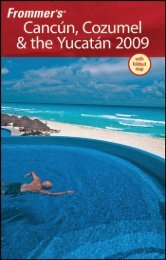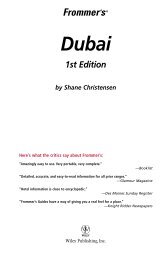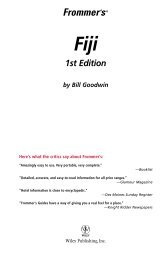You also want an ePaper? Increase the reach of your titles
YUMPU automatically turns print PDFs into web optimized ePapers that Google loves.
202<br />
PLANNING YOUR TRIP TO LAOS<br />
10<br />
HEALTH<br />
now have ATMs in Vientiane, Luang Prabang,<br />
Pakse, Savannahkhet, and Tha<br />
Khek. ATMs are springing up at a rapid<br />
rate, and many accept both Visa and MasterCard.<br />
<strong>The</strong>y are not particularly useful if<br />
drawing money from a foreign account,<br />
since they only issue Lao kip with a daily<br />
limit in the region <strong>of</strong> 700,000 kip and the<br />
transaction charges are very high. Bank<br />
exchange booths are far better. <strong>The</strong>y are<br />
rapid and can issue U.S. dollars as well as<br />
Lao kip. In Luang Prabang, many travel<br />
agents also change money and traveler’s<br />
checks as well as advancing cash on a<br />
credit card.<br />
<strong>The</strong> <strong>of</strong>ficial currency is the Lao kip.<br />
Notes come in denominations <strong>of</strong> 500,<br />
STAYING HEALTHY<br />
Like many poor tropical countries <strong>Laos</strong> is<br />
host to a variety <strong>of</strong> ailments. It’s a good<br />
idea to check the most recent information<br />
at the Centers for Disease Control (click<br />
“Travelers’ Health” at www.cdc.gov).<br />
No water in <strong>Laos</strong> is considered potable,<br />
so stick with bottled water. Also, Lao cuisine<br />
uses many fresh ingredients and garnishes,<br />
and condiments made from dried<br />
fish that might have been stored under<br />
unsanitary conditions. Exercise caution<br />
when eating from roadside and market<br />
stalls and smaller local restaurants. You<br />
should make sure that the vaccinations<br />
you had as a child—polio, measles,<br />
mumps, rubella, and so on—are up to<br />
date. This is especially true if you plan to<br />
be working with children.<br />
In <strong>Laos</strong>, medical facilities are scarce and<br />
rudimentary. Emergency medical facilities<br />
exist in Vientiane, but outside the capital<br />
you’ll require medical evacuation. Contact<br />
information is provided in “Fast Facts:<br />
<strong>Laos</strong>,” in chapter 16.<br />
5 HEALTH<br />
1,000, 2,000, 5,000, 10,000, 20,000, and<br />
50,000 (the endless zeros can give you a<br />
real headache after a while). <strong>The</strong>re are no<br />
coins. Both the Thai baht and the U.S.<br />
dollar are also accepted and are used for<br />
larger transactions. If you are carrying<br />
larger amounts <strong>of</strong> cash, then it is best to<br />
carry dollars or baht. Also bear in mind<br />
that the kip is non-exchangeable outside<br />
<strong>Laos</strong>.<br />
Credit cards are accepted by larger<br />
hotels, more expensive restaurants, and<br />
boutiques. In general, though, their use is<br />
restricted and <strong>Laos</strong> is very much a cash<br />
economy.<br />
Traveling to <strong>Laos</strong> puts you at risk for<br />
many <strong>of</strong> the same ailments you will find<br />
in <strong>Cambodia</strong>. For a list <strong>of</strong> these ailments<br />
and their symptoms, see p. 39. <strong>The</strong>re was<br />
an outbreak <strong>of</strong> cholera in southern <strong>Laos</strong><br />
in 2008. As in <strong>Cambodia</strong>, malaria is a<br />
threat in the jungle areas <strong>of</strong> <strong>Laos</strong>, though<br />
is not a risk in major cities. If you’re in a<br />
remote area, sleep under a mosquito net<br />
and use a repellent with DEET, especially<br />
at dawn and dusk. Note that in <strong>Laos</strong> the<br />
disease has developed a fairly strong resistance<br />
to most anti-malarials (particularly<br />
the provinces <strong>of</strong> Bokeo, Luang Nam Tha,<br />
Salavan, and Champasak, as well as the<br />
areas along the Thai and Burmese borders).<br />
Schistosomiasis may occur if<br />
swimming in the Mekong River. It is a<br />
disease caused by a waterborne parasite,<br />
generally carried by certain kinds <strong>of</strong> snails.<br />
If left untreated it can cause severe organ<br />
damage. Most people show no early symptoms,<br />
though they may include rash or<br />
itchy skin, fever, chills, cough, and muscle<br />
aches










